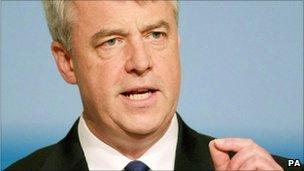Lansley sorry as nurses pass 'no confidence' vote
- Published
Andrew Lansley tells an audience of nurses "I am sorry if what I'm setting out to do hasn't communicated itself"
Health Secretary Andrew Lansley has said he is "sorry" for failing to communicate his plans for the NHS in England.
He was speaking to an audience of 65 nurses at the Royal College of Nursing conference.
Earlier some 96% of 497 delegates in Liverpool took the unprecedented decision to give him a vote of no confidence.
It comes on the day Labour called on the government to scrap its NHS plans.
Mr Lansley's appearance at the Liverpool meeting had caused anger among nurses who wanted him to address the whole conference rather than having a smaller meeting.
The meeting with nurses was part of the government's "listening exercise" which was launched last week amid mounting criticism of his reforms.
He said: "I am sorry if what I'm setting out to do hasn't communicated itself."
He went on to say he believed that there was a shared objective in ensuring the NHS was free at the point of use.
And he added: "I'm here to listen not to lecture.
"My view is that we are working together to support these principles and if we've not got that right we will do so with your help."
He then went on to apologise another three times during the 90-minute meeting, before saying: "I would be joining you in voting against me if I thought the product of what I was doing was to undermine the NHS."
Later on he told journalists separately that he accepted the vote of no confidence was a "rebuke" and he would be looking to address the concerns.
'Time to oppose'
His comments came after heated exchanges during a debate at which nurses voted in favour of passing a motion of no confidence in the health secretary's handling of the NHS reforms.
Nurses said they were angry about the changes and the way the government was running its new consultation.
David Dawes, a nurse from Manchester, said the RCN had tried to engage with government in the past, adding he did not believe it was interested in changing its plans so now was time "to oppose".
Zeba Arif, a mental health nurse from London, said: "Reform means making it better. Is this making it better? No it is not."
And Bethann Siviter, a nurse who now works in Birmingham after moving to England from the US, added: "If this goes forward the NHS is dying. I come from a country with private health care. Don't go there."
The motion of no confidence in Mr Lansley was backed by 478 delegates, with six opposing it and there were 13 abstentions - it is thought to be unprecedented.
Under the shake-up, GPs are to be given control of much of the NHS budget, while greater competition with the private sector will be encouraged.
But critics, including the Royal College of Nursing, have warned the changes could undermine the NHS.
After months of attacks, the government said last week it would run another consultation, even though the bill underpinning the changes has already started progressing through Parliament.
'Junk it'
Wednesday marked the first significant step in that process - and saw Labour leader Ed Miliband make a speech about the NHS.
Mr Miliband warned the plans would put hospitals at risk and lead to staff losing the power to do what they believed was best for patients.
"The answer to a bad bill is not to slow it down, but to junk it," he added.
Mr Lansley responded saying: "Ed Miliband is being deliberately misleading. It is wholly inappropriate for him to use the NHS as a political football like this."

Mr Lansley is said to be there to "listen and reflect" rather than lecture
In the morning, Mr Lansley met voluntary sector chiefs in Downing Street to discuss how they can get involved in delivering services.
He then travelled to Liverpool to meet nurses. But instead of addressing the entire conference - as public health minister Anne Milton did on Tuesday - he met a smaller group of nurses representing all parts of the UK.
The decision caused anger among delegates at the conference.
Mike Hayward, a nurse from London, who attended the meeting with Mr Lansley, said it would have been better to have addressed the main conference.
But he added: "It is pleasing he has come here, but I wonder what difference it will make. He seems to have Victorian attitudes to the NHS - that doctor knows best.
"We want to see nurses and other groups represented more."
It was a theme echoed by other participants. Many expressed concern about the cuts that were taking place on the front-line as well as the scale of the changes.
Some questioned whether the concerns would be really taken on board. But Rachael Armstrong, a hospital nurse, said: "I do feel he got the message and I think he has to act now."
Peter Carter, the general secretary of the RCN, added: "I hope the health secretary goes away and thinks about what we have said to him. If there aren't changes there will be a hardening of opposition."
- Published13 April 2011
- Published26 May 2011
- Published1 March 2013
- Published11 April 2011